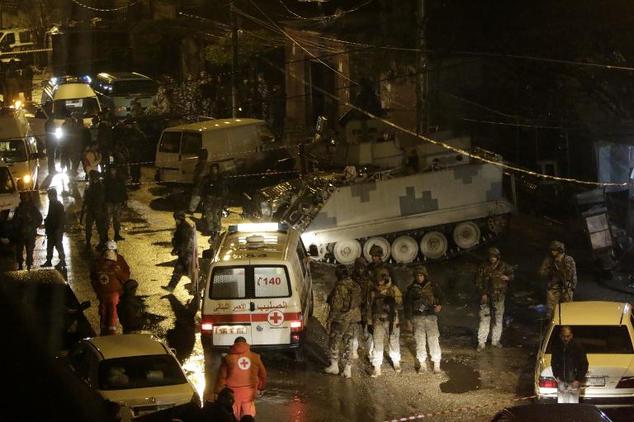
The fundamentalist group al-Nusra Front on Saturday claimed responsibility for a twin suicide bombing in the Alawite neighborhood of north Lebanon’s port city of Tripoli, which killed at least 9 people and injuring 37 others.
The al-Qaida-linked fundamentalist group said on its Twitter account that the attacks against a coffee shop was carried out by the Nusairi National Democratic Party in Jabal Mohsen as a revenge to the Sunnis in Syria and Lebanon.
The National News Agency previously reported that the suicide bombers are Lebanese nationals from the al-Mankoubin Sunni neighborhood in Tripoli.
It identified them as Taha Samir Kayyal and Bilal Mohammad Ibrahim and that an Intelligence Unit from the Lebanese army is surrounding their houses in the area.
According to a security source who spoke on condition of anonymity, the first suicide bomber blew himself at the entrance of a popular coffee shop known as “Amran” and while the survivors and onlookers tried to help the victims, the second suicide bomber trigger the attack, leaving at least nine killed, and 37 others wounded.
The army has cordoned off the area and a curfew has been imposed on Jabal Mohsen, in an attempt to avoid possible sectarian violence.
Over the past few years, Tripoli’s Alawite Jabal Mohsen neighborhood has been locked in violent clashes with the Sunni neighborhood of Bab el-Tebbaneh.
But in September, the Council of Ministers adopted the recommendations of the Higher Council of Defense and charged the army with executing a security plan to restore law and order to the largest city of North Lebanon.
Normality began to come back, and the army managed to apprehend most of those who were involved in the fighting between the neighborhoods.
But the latest explosions brought back fears of further sectarian division and the return of violence to the city, which prompted a wide campaign of condemnation particularly from the Hezbollah Shiite party and the al-Mustabla Movement that represents the majority of Lebanon’s Sunnis.
Hezbollah, which is currently engaged in dialogue with al-Mustaqbal with aim at defusing the sectarian tension, issued a statement condemning the attack, saying that the blast is “a clear attempt to fuel the sectarian tension in the country.”
The militant party called on the people of Jabal Mohsen to “stay calm and prevent any attempt of being dragged again into any kind of fighting.”
In a statement, Al-Mustabla movement also condemned the suicide bombings, and called for avoiding any further escalation that “would only serve those who are annoyed by the ongoing dialogue atmosphere in the country.”
“The incident … only serves the enemies of civil peace and the coexistence,” said the statement, adding that the “blood of those killed in Jabal Mohsen is the blood of all the Lebanese who believe in their unity.”
Lebanon’s Prime Minister Tamma Salam also slammed the terrorist bombings. He said the attack “can never terrorize the Lebanese or weaken the country’s determination and decision to confront terrorism and terrorists.”
“Our military and security forces are at their highest level of awareness and readiness, and are marching ahead with the implementation of the security plan and tracking down of all those who wish to harm Lebanon and the Lebanese”, Salam said in a statement.
He urged the people of Tripoli to rally around the armed forces, and demonstrate highest degrees of responsibility and self-restraint so as to thwart the attempts of the forces of darkness.
Also on Saturday, former President Michel Suleiman issued his condemnation of the terrorist attack.
He said terrorism will not succeed in dragging Tripoli and its people to civil strife at such a critical moment in the country when it needs a national dialogue that could lead to an ease in sectarian tensions, and the election of a new president.
Xinhua

Leave a Reply
You must be logged in to post a comment.